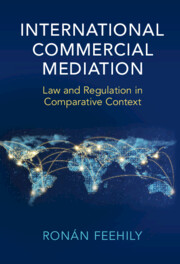Book contents
- International Commercial Mediation
- International Commercial Mediation
- Copyright page
- Dedication
- Contents
- Preface
- Foreword
- Cases
- Statutes
- International Conventions, Laws, Codes and Rules
- 1 Introduction to Commercial Mediation
- 2 Commercial Mediation in the International Context
- 3 Agreements for Future Mediation
- 4 Approaches to Mediation
- 5 Mediators and Their Appointment
- 6 Lawyers and Other Professional Mediation Supporters
- 7 Conduct and Costs
- 8 Mediated Settlement Agreements
- 9 Confidentiality
- 10 Process Controversies
- Bibliography
- Index
4 - Approaches to Mediation
Published online by Cambridge University Press: 01 September 2022
- International Commercial Mediation
- International Commercial Mediation
- Copyright page
- Dedication
- Contents
- Preface
- Foreword
- Cases
- Statutes
- International Conventions, Laws, Codes and Rules
- 1 Introduction to Commercial Mediation
- 2 Commercial Mediation in the International Context
- 3 Agreements for Future Mediation
- 4 Approaches to Mediation
- 5 Mediators and Their Appointment
- 6 Lawyers and Other Professional Mediation Supporters
- 7 Conduct and Costs
- 8 Mediated Settlement Agreements
- 9 Confidentiality
- 10 Process Controversies
- Bibliography
- Index
Summary
Various models of mediation have been developed, reflecting mediation practice. In a commercial context, the most important distinction is between evaluative (or substance-oriented) mediation and facilitative (or process-oriented) mediation. However, in practice, a purely facilitative approach to mediation is rare, and experience suggests that a successful mediation results from using a clearly identified ‘mixed process’. Pre-mediation considerations are important in laying the groundwork for a successful mediation. The temporal contours of the process are also important to bear in mind, particularly when considering issues such as limitation periods, confidentiality and costs. The mediation process develops through stages and phases during which the mediator helps the parties towards resolution. Free from the constraints of viewing the dispute in terms of legal rights and obligations, the parties create an opportunity to empower themselves to resolve the dispute and essentially determine the future. The process offers them the opportunity to emerge from commercial conflict stronger, personally and contractually, with an outcome that better reflects their needs and interests.
- Type
- Chapter
- Information
- International Commercial MediationLaw and Regulation in Comparative Context, pp. 83 - 103Publisher: Cambridge University PressPrint publication year: 2022

